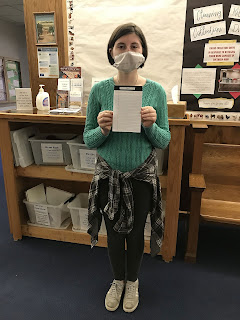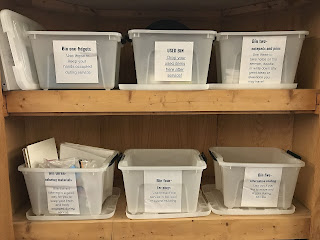At Church of the Master in Westerville, Ohio, members are loving God, growing in Christ, and living to serve with their new Sensory Accommodation Library (SAL). This effort to improve the accessibility of worship for those with sensory needs was initiated by summer ministry intern, Emily Knoth, who was able to use resources from DMC.
Knoth shares that the idea first came to her while leading some raucous singing on VBS Sunday: she glanced at her seventeen-year-old co-leader, Ainsley Patterson, and noticed that she appeared to be uncomfortable with the volume. Knoth thought that ear plugs would be helpful. She drew inspiration and insight from how Galileo Church in Fort Worth, Texas celebrates neurodiversity by providing resources for people with sensory needs.
Often, children and adults who live with challenges such as anxiety, autism, early onset dementia, post traumatic stress disorder (PTSD), and stroke find it difficult to attend worship, and other church-related activities, due to the effects of a hidden disability called sensory processing disorder. This condition can overwhelm those affected by it with the sights, sounds, and smells around them, sometimes even resulting in physical pain.Awareness of this situation motivated Knoth to take action. She found resources in an article from the DMC website about Faith UMC's sensory-inclusive certification. Next, she located a pulpit no longer in use, and turned it around to expose shelves for holding six plastic supply bins. She identified a source of funding for the purchase of ear plugs, an adaptive seat cushion, notepads with pens, and tactile fidgets. One bin is reserved for used items that need to be sanitized for the next service. The availability and location of the SAL is announced at the beginning of each worship service.
When Knoth completed her internship, she encouraged Patterson to step up and maintain the SAL. Now, Patterson regularly replenishes supplies as needed, which now includes designing graphic coloring pages for use during worship services. Patterson reflects, “The SAL makes me happy, because I now know that people are increasingly trying to understand and support the [disability] community. The SAL is important, because it shows that we can all benefit from the same resources, despite our differences.” Thus, it would seem that this project is fulfilling its purpose as announced in the weekly bulletin: “The goal of the SAL is to make our worship experience a more inclusive place for everyone who attends.”
Mimi Lubbers for DMC, January 2022




No comments:
Post a Comment